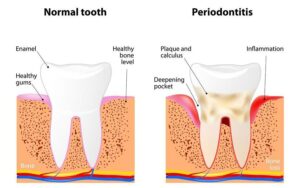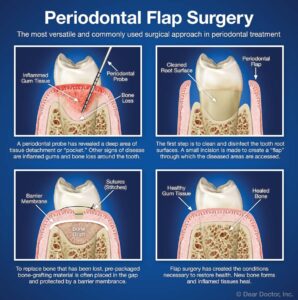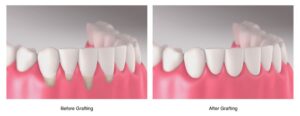Gum Surgery: A Complete Guide to understanding the procedure
Why Gum health matters
Healthy gums are required to keep the teeth in a firm, healthy position. Poor gum health causes the gums to swell & recede, leading to tooth mobility, tooth sensitivity, and bad breath. Even artificial prosthesis such as crowns, bridges & veneers need healthy gums. Poor oral/gum health can lead to overall general health problems such as heart disease, stroke, and respiratory infections in pregnant preterm babies and low birth weight babies.

What is gum surgery?
Gum surgery is done to restore gum health. It is done to repair swollen, infected and receding gums. Gum surgery also corrects gummy smile.
Why you might need Gum surgery
A person suffering from conditions such as Gingivitis & Periodontitis may need Gum surgery for betterment of their condition.
Types of Gum surgery
Deep scaling & root planning: These procedures remove the bacteria & tartar buildup from deep pocket spaces around the teeth. Root planning procedure additionally smoothens the root surfaces while removing the tartar buildup.
Flap surgery: In this, the gums around the teeth are opened up to gain access to the deposits deep inside the pockets. Defects in the bone are created due to anatomy or can be plaque induced. After the removal of tartar and granulation tissue, the defects are reshaped and bone grafting can be done to augment the bone or to fill in the bony defect.
In addition, Guided tissue regeneration can be done where in a mesh like material is placed below the gums before suturing, this allows the bone graft to grow and occupy the space left by the bony defect and prevents the gum from going back to its original position.

Gum grafting: In case of gum recession near the tooth, a tissue graft is taken from the palate area and is grafted in the area of gum recession.

Gummy smile correction: Excess gum tissue can be recontoured with the help of laser or scalpel to improve the smile.
Post surgery care & Recovery
Dentist will provide full instructions in detail after the surgery. It may take few days for the pain to completely subside. So pain killers are advised. No smoking, alcohol is recommended during the recovery period. Antiseptic mouthwash is to be used. Diet should consist of soft foods during the recovery period.
FAQs
Is gum surgery painful?
Some sensitivity might be experienced for few weeks after the surgery to hot and cold foods. Dentists can prescribe desensitizing tooth paste for the same.
How much time does recovery after gum surgery take?
One to 2 weeks. There can be some bleeding in the first 2 days, which will subside eventually.
Will Insurance cover Gum surgery?
Talks must be held with the insurance provider, as some providers cover and some do not.
Conclusion
Gum disease must be taken seriously, as it leads to damage of the bone and the tissues around it. It is also associated with general diseases such as cardiovascular disease, pulmonary disease, etc. At Solitaire Family Dentistry, we emphasize getting regular checkups with 6 month cleaning appointments to remove the plaque and tartar buildup. Our aim is to educate our patients regarding the importance of regular visits and maintaining oral hygiene. Visit our dentalcare in kphb to know more about your gum health. Contact us at 6281497455


